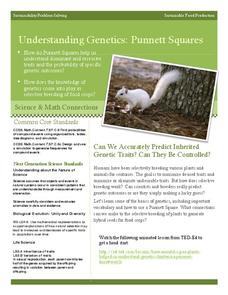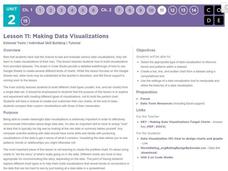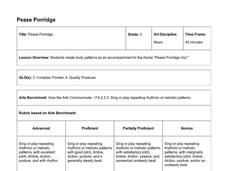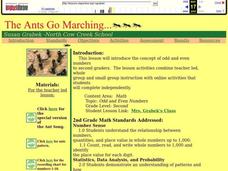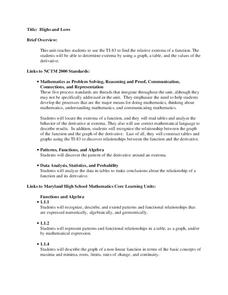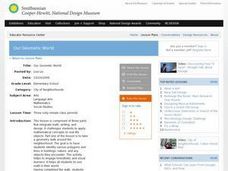Bowland
DanceStar
Express dance moves mathematically. Scholars dissect dance routines and express them using mathematical notation, such as translations and rotations. They use video clips to investigate seven different dance genres.
Western Kentucky University
Understanding Genetics: Punnett Squares
Can scientists really predict genetic outcomes or are they simply making a lucky guess? Scholars first learn about Gregor Mendel and how to make Punnett squares. Then they extract DNA from a strawberry in a lab with included conclusion...
Curated OER
Interpreting Graphs
Sixth graders interpret linear and nonlinear graphs. They create graphs based on a problem set. Next, they represent quantitive relationships on a graph and write a story related to graphing.
August House
The Pig Who Went Home on Sunday
Turn your classroom into a pig sty with a instructional activity based on the Appalachian folktale The Pig Who Went Home on Sunday. Similar to the story of The Three Little Pigs, the folktale tells a story of four pigs who leave...
University of Georgia
Using Freezing-Point Depression to Find Molecular Weight
Explore the mathematical relationship between a solvent and solute. Learners use technology to measure the cooling patterns of a solvent with varying concentrations of solute. Through an analysis of the data, pupils realize that the...
Code.org
Making Data Visualizations
Relax ... now visualize the data. Introduce pupils to creating charts from a single data set. Using chart tools included in spreadsheet programs class members create data visualizations that display data. The...
Rainforest Alliance
Forests of Guatemala
With 90 percent of its land area covered in forests, Suriname, a country in South America, contains the largest percentage of forests throughout the world. Here is an activity that brings classmates together to learn about the...
Missouri Department of Elementary
Are You Balanced?
Balance scales create a strong visual of how an individual prioritizes one's self alongside their commitments to the community, school, and home. Scholars complete a graphic organizer then discuss their findings with their peers. A...
Hawaiʻi State Department of Education
Pease Porridge
Practice using different ways to express a single pattern. The class uses concrete, pictorial, and numerical modes to represent patterns found in a simple rhyme. They will move their bodies, use body percussion, draw, and use numbers to...
Curated OER
Skip Counting to Music
Your youngest mathematicians skip count by 2's, 5's, and 10's as they sing along to a Hap Palmer song that helps them remember the patterns. Young scholars practice in whole group and then individually with the worksheet provided, using...
Curated OER
Try Tessellation
Most middle schoolers probably feel that quilting is at best an activity left to their grandmothers. This lesson uses the Zome modeling system to get them to realize how shapes in quilting are really tessellations and repeating patterns....
Curated OER
Investigation - Looking For Triangles
Seventh graders investigate a series of triangles, looking for patterns and generalizing what they have found. They analyze the pattern data and organize it into a table and graph. Students identify the relationship and discover the rule...
Curated OER
Line Symmetry and Rotational Symmetry
Fifth graders investigate the symmetry of pattern block shapes. Students, working in groups determine whether each shape has line symmetry, rotational symmetry or both kinds of symmetry. Students determine how many lines of symmetry the...
Curated OER
Odd and Even
Explore the concept of odd and even with your class using this resource. Learners take an online test demonstrating their knowledge of odd and even, sing a song about the concept, and engage in computer-based activities.
Curated OER
Highs and Lows
Solve problems using integration and derivatives. By using calculus, learners will analyze graphs to find the extrema and change in behavior. They then will identify the end behavior using the derivatives. Activities and handouts are...
Curated OER
Products, Multiples, Factors
In this products, multiples, and factors worksheet, students complete various activities where they solve problems for products, multiples, and factors of numbers. Students complete 14 problems.
Curated OER
A Honey of a Hexagon
Learners explore how bees make honey and why the hexagon is the best basic pattern for the honeycomb through the use of a video and hands-on activities with honeycombs and geometric shapes.
Curated OER
Introduction to Limits
High schoolers practice using graphing calculators and spreadsheets as they explore numeric limits using sequences and functions. They complete a sequencing worksheet, and determine which sequence corresponds to story a story called...
Curated OER
Same As
Explore the concept of the equals symbol. In this mathematical symbols lesson, learners discover the meaning of the equals sign (symbol). They also construct addition and subtraction sentences to understand the concept of equal parts.
Curated OER
Data Lesson Vital Information
Students prepare and collect data and use excel and create a graph. They collect data about the number of pattern blocks that are put on tables. Students then record that data in Excel.
Curated OER
Class of Gold
How can you see a number in nature? Here, learners discover both Fibonacci numbers and the golden ratio by exploring a number of different resources. Note: Some of the resources are older and may be missing some of the links, but...
Curated OER
Our Geometic World
Young scholars walk around the neighborhood and identify various polygons and lines in buildings, nature and other objects. They design a building using various geometric patterns, shapes and lines. Students complete a descriptive...
Curated OER
Interpreting Data from Birdfeeders
What kinds of birds live in your area? Read a book about birds to your learners and explore their feeding patterns. Charts and graphs are provided in this three page packet, but consider assigning the basic questions if using with young...
Curated OER
Principles of Flight: Flying Paper Airplanes
Students investigate ways to enhance an object's flying ability. In this model construction lesson, students construct two paper airplanes, one of which is twice as big as the first. Students compare and contrast the two...
Other popular searches
- Growing Patterns in Math
- Number Patterns in Math
- Geometric Patterns in Math
- Pasta Patterns in Math
- Increasing Patterns in Math
- Patterns in Math Quiz
- Repeating Patterns in Math
- Color Patterns in Math
- Identifying Patterns in Math
- Nature's Patterns in Math

